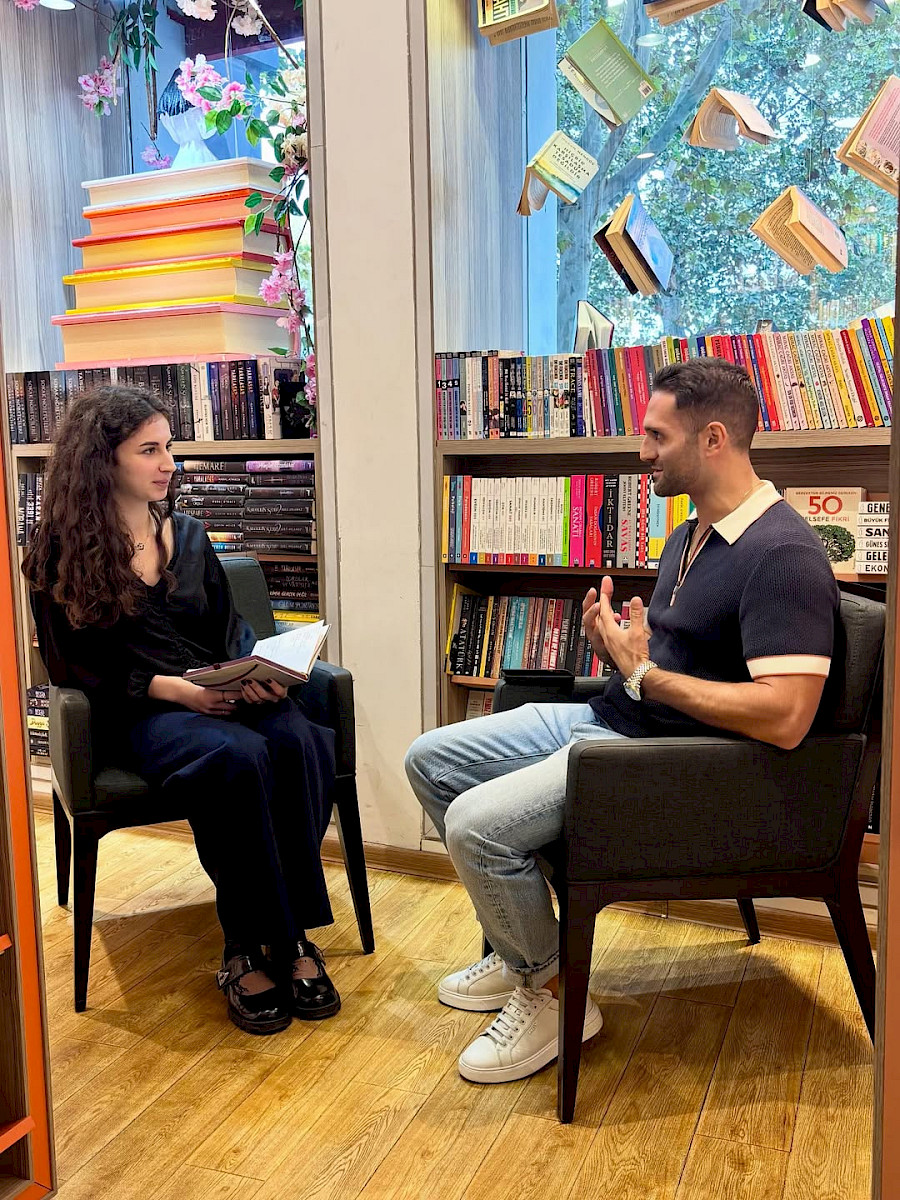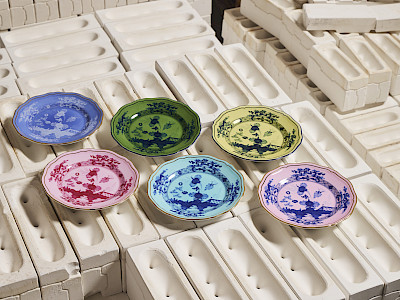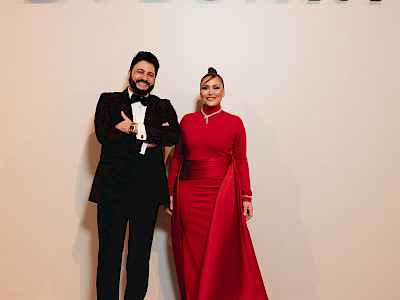
Daniel Chidiac is an Australian author, entrepreneur, and content creator known for his books on self-development and romance. He gained prominence with his debut book, Who Says You Can't? You Do, and is also recognised for his romantic novel The Modern Break-Up. NARGIS Magazine had a chance to sit down with Daniel in Baku and have a thought-provoking conversation.
How did you start to write?
I started writing when I left university and I had absolutely no idea what I wanted to do in my life, but I knew that I didn't want to be at university doing commerce. So, I packed up my books and I left. I'm not sure I would recommend that to everybody, but I just knew that I didn't want to be there and I had that strong gut feeling that this is just not for me.
I left and I just was lost after that. I had so many different jobs: marketing specialist, personal trainer, clothing business – I hit what some people would call rock bottom, but in my book, I call it the point of awareness because I believe that it's a point where you make drastic change in your life.
I was trying everything and I was in a lot of debt. I was probably in about $70,000 in debt at 23 years old. Not a good start to life. But in that moment when everything was just falling apart in my life, I found myself. And it's strange because we like to think that when we're winning in life is when we're learning and we're happy as such. But I think you learn the most when everything is not going your way and you have to learn to adapt.
And in that moment when I found myself and I found just this essence to life that I thought, “Well, I've got nothing at this point materialistically or financially,” it made me just appreciate the simplest things in my life. And that's when I started writing. It was like someone had come and pulled a blanket from over my face and I could see everything so clearly. And I just knew I had to write it down.
Was it kind of a journal or did you plan to publish it at some point?
I didn't plan to publish it at all. I had never thought that I was going to publish my work. I was writing for about two years. I wouldn't say it was so much as a journal like “Dear Diary.” But it was me just writing down all these awakenings like, “but what if this?” For instance, I woke up yesterday and I thought that I was going to make a coffee and then I actually made that coffee and then it's in my reality now. But what if I decided to wash my car in that moment? Then that means that coffee moment wasn't going to exist in my reality. I thought I was going crazy to be honest, but my mind was just flooding with thoughts and it was all coming back to me. I was waking up at 4 in the morning, 3 in the morning. It was just pouring out of me. I had never been a writer.
You said you were writing for two years, but what did you do meanwhile? How did you make a living?
Doing odd jobs. Just literally digging holes. I was working on the train tracks. I was literally digging, shovelling rocks just to pay the debt that I said I had from the clothing business. But it was strange because as I was writing in that moment, I would just always say to myself, something's going to change. And I knew in that moment that my thoughts create my life. I was patient. I was like, no, it's going to come. It's going to come. Everything's going to come. And I'm going to work out what I'm going to do in my life. Little did I know that my writing was going to be what I was going to do.
Did you show your writings to anyone?
It wasn't until I was sharing my stuff on Facebook. Instagram was not really a thing back then. People started sharing it and writing comments. And I'm like, oh, that's really cool. I remember I got like 500 followers after six months. I was so happy with these 500 followers. Maybe people like to hear my stuff.
About two years later, I was laying on my bed and I was in like this sort of meditative state – feeling bliss and peace. I was at a really good place in my life, even though I didn't have much materialistically. And it was like a light bulb went off in my head. I can't explain it to you, but I believe in God. I believe that there's a source and I'm connected to this source. Whatever it was just went “bang,” slapped me and said, “you're going to turn your writing into a book.”
How was the publishing process? How did you get the right contacts? Did you have to pay for printing?
They're very good questions. Very good questions. I self-published initially. I had looked up the publishing route and I realised that I was going to need an agent. I had editors read my book that I was willing to pay at the time to edit my book. I got rejected by five of them. They wouldn't even edit my book because they said it wasn't going to go anywhere. They didn't want to take my money. They felt sorry for me.
There was a time when I got rejected by an editor, and she was one of the biggest in my state, in Victoria, Australia. I remember I ran to the park and I cried. I literally came to tears because I had spent three years working on this book at the time. To have the biggest editor basically say, “Choose a different career because, we don't think you're going to make a living out of this,” it was very hard to swallow.
But I'm very stubborn. I knew that it was my calling because I didn't choose this. It chose me, I felt, in so many different ways. So, I self-published initially, and I finally found an editor that would work with me and do it. Then I went with a company called Ingram, which is a big distributor in the world, and they help me put it on Amazon and Barnes & Noble.
What happened afterwards?
I thought, “The people are going to be my judge. I'm not going to let these publishers, editors, they're not going to be my judge.”
I self-published, and I sat on the book for about a year and a half. No one even knew it was out. Then I saw this whole Instagram thing going on, and there was a company that was doing marketing with their coffee scrub thing. I remember thinking, “who's going to rub coffee on their body? This is craziness.” A couple of months later I saw an article saying they turned over $20 million. I decided to put my book on Instagram. I did, and it worked. That’s when the big publishers like Penguin Random House approached me. This was back in 2017.
Tell me about your latest book.
I just released a book a couple of months ago, it's called Stop Letting Everything Affect You. It's my other self-help book. I decided to write another self-help book, another thing that I said I wouldn't do for 20 years. I was like, I'm not writing another self-help book for a long time. But it came to me, and I had to get it out. And it's really taken off. So that could be in Azerbaijani very soon, too. I'm quite blessed with how successful it's been so far.
One of your book’s titled Who says you can't? You do. I have this thought about inspirational books – they like guide you, they tell you how you should think or how you should shape your thoughts in order to achieve some meaningful things in your life, but this only happens for a short period of time. How do I stay true to this in the long term?
The only way to me in order to do it in your life is to practise it. And I'm talking about literally observing your thoughts and it may drive you crazy for a while, but observing every single thought that you have and manipulating those thoughts. You have to manipulate your thoughts and you have the power to do that.
You have to question every single one of your thoughts for a long time until it becomes so ingrained in you that you realise, and like I said, that doesn't mean that you're going to live happily ever after or that you're not going to be challenged. Of course, you are, I am every single day, but you will have that foundation to fall back on. So yeah, you can read a book, it can pump you up and you can be excited and then what have you, but it's the work that you've got to do every single day. It's you waking up in the morning and saying, yeah, I feel negative right now. I've woken up feeling really weird and funny because I do. I wake up like that nearly every day. But then me saying, no, I'm going to go on this balcony, like I do with my coffee, and I'm going to force myself to feel love.
Have you ever had thoughts that you were ashamed of or like afraid to have?
Definitely, definitely. I've felt guilt. I've felt shame in my life, things that I've done I wish I didn't do. Of course, people turn around and say, “You should never regret anything.” I think, well, no, sometimes you can look back and be a little bit ashamed or have a little bit of guilt.
Now, the rule still applies that it taught you something. So, I guess in essence, was it meant to happen? Yes, because you evolved. But does it mean that you would do it again? No. People say, if you had your time again, would you change things? That's a hard one because I wouldn't be who I am today if I did. But in saying that, there's a lot of things I wouldn't do. So, I think the answer to the question is, yes, I have, but I've learnt from my experiences.
Do you have a favourite author?
A favourite author? Yes, I would say that I do. Khalil Gibran. He's one of the most famous poets in history. I read more poetry and more ancient empire writings like “Meditations” Marcus Aurelius. I love that book because he talks a lot about death, surprisingly. Now, what I mean by that is he saw so much death on the battlefield. So, this has gone a little bit away from Khalil Gibran, but this is sort of equally my favourite book. He speaks a lot about death as being a way to live.
He speaks a lot about our mortality, that we're not immortal, that we are mortal beings and that we are here for a certain amount of time and that we are going to die. It makes you realise that you are going to die, that you are mortal. And it's like, oh my God, it's sort of like a slap in the face. It's like, what am I doing? I'm wasting my time stressing about the most ridiculous thing. I'm stressing about whether someone takes me back when I'm not even going to be on this earth forever and there's so many amazing things that I can do. And I think we get so caught up and so dragged into our own world that sometimes we need to scale out and we need to look out and look at the bigger picture.
Now that you're a writer, how did this shape your approach to literature?
I started to read less and I'll tell you why, which is interesting to me as well. I started to watch films more. The reason was because I believe I was so entrenched in my work that seeing words on paper… you know, it's almost like a musician when they say they don't listen to their own genre of music.
What challenges do you think authors face today? What challenges did you face?
I think one of them is that the market seems to be flooded. Everyone wants to seem to be writing a book or things become very overwhelming. But you just have to stay true to what you're doing and just ignore the noise.
Another thing is comparing your journey to other people. I was writing out of my suburban home in Melbourne looking outside my window thinking who is ever going to read this? But at that time when I was writing it didn't even matter.
Furthermore, when I speak to younger authors, they're like oh, does this sound good? I'm like, it doesn't matter now. Don't even write chapter one, chapter two, chapter three, forget that. Just write, write, write. And then at the end, you put it all together.



